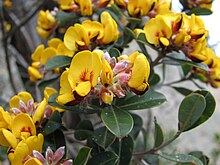Pultenaea daphnoides
| Pultenaea daphnoides | |
|---|---|
 |
|
| Pultenaea daphnoides at Kooyoora State Park, Victoria | |
| Scientific classification | |
| Kingdom: | Plantae |
| (unranked): | Angiosperms |
| (unranked): | Eudicots |
| (unranked): | Rosids |
| Order: | Fabales |
| Family: | Fabaceae |
| Subfamily: | Faboideae |
| Tribe: | Bossiaeeae |
| Genus: | Pultenaea |
| Species: | P. daphnoides |
| Binomial name | |
|
Pultenaea daphnoides J.C.Wendl. |
|
| Synonyms | |
|
Pultenaea obcordata Andrews |
|
Pultenaea obcordata Andrews
Pultenaea daphnoides (large-leaf bush-pea) is a shrub which is endemic to Australia. It is a member of the genus Pultenaea and the family Fabaceae.
The species is an erect shrub that can grow to between 1 and 3 metres high. The leaves are cuneate to obovate and 5 to 40 mm in length and 2 to 11 mm in width.
The pea flowers, which appear in dense terminal heads in spring and summer, are yellow with red markings. The pods which follow are flattened and 5 to 7 mm long.
The species was formally described by German botanist Johann Christoph Wendland in 1798 in Botanische Beobachtungen.
It occurs in heath to wet sclerophyll forest in South Australia, Victoria, Tasmania, New South Wales and Queensland.
...
Wikipedia
